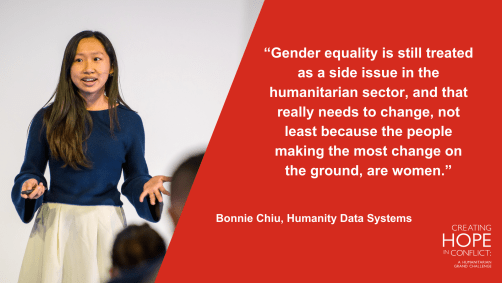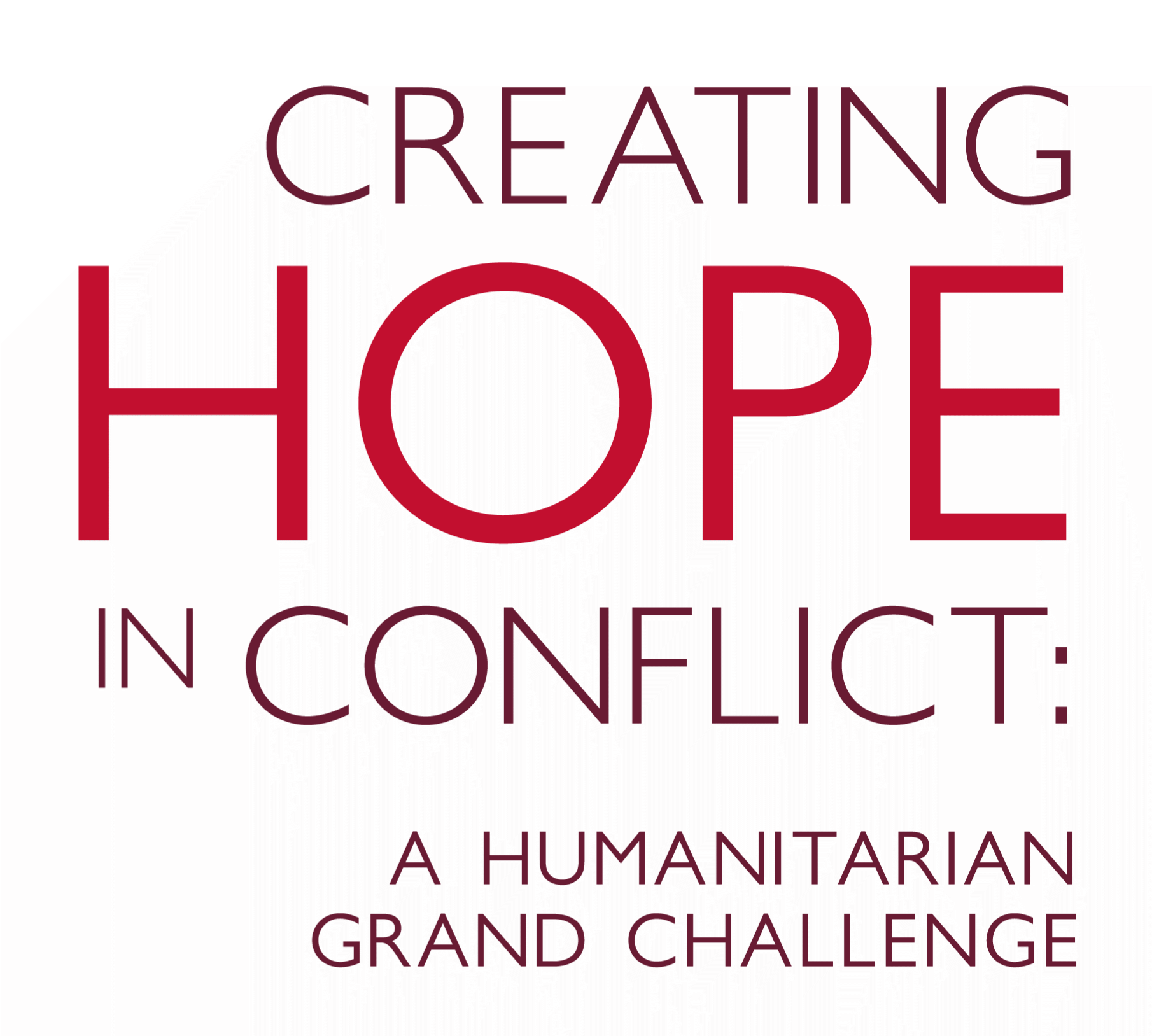It is estimated that over 40% of the half a million humanitarian workers who provide frontline care during emergencies, conflicts and disasters, are women. Women are at the forefront of improving health, access to safe water, providing life-saving information and more for conflict-affected populations through service delivery, education and capacity strengthening, advocacy and research. Women are also disproportionately affected by conflict and humanitarian emergencies, but their voices are largely missing from efforts to treat the problems they face.
This 8 March, we’re celebrating International Women’s day by highlighting a few of the incredible women we support who work towards helping the most vulnerable people in conflict. Refugees, epidemiologists, social entrepreneurs, and more – these women are working on game-changing contributions in the humanitarian sector.
Women Humanitarians
To reach the hardest-to-reach people affected by conflict, we must be innovative; to innovate we must collaborate and ensure women are at the forefront of that conversation and process. To meet the needs of millions of people around the world, we must implement interventions that adequately address the complexity and diversity of the crises they are experiencing. That means women, especially women from affected communities, must be leaders in transforming and improving the humanitarian system.
“Gender equality is still treated as a side issue in the humanitarian sector, and that really needs to change, not least because the people making the most change on the ground, are women.” (Bonnie Chiu, Humanity Data Systems)
Aisha Jumaan, PhD
President of the Yemen Relief and Reconstruction Foundation, Dr. Aisha Jumaan is an epidemiologist, global public-health expert and leader in Yemen’s relief response. Where lack of clean water leaves millions at risk of cholera and COVID-19, Dr. Jumaan’s work is helping Yemenis, especially those living in hard to reach areas due to security or geography.

Aisha is working in Yemen – the world’s largest humanitarian crisis, where COVID-19 compounds existing and ongoing needs including food insecurity, lack of access to clean water and a collapsing health system. In Yemen, where over 24 million people are in need of life-saving assistance, Dr. Jumaan’s solar-powered water purification system will help millions of people access safe water, and reduce the risk of cholera and waterborne disease that exacerbate malnutrition.
Grace Tang
How does language inclusion make or break humanitarian aid efforts? “In remote or rural areas, or in situations where people have had to flee their homes, it can be very difficult to communicate meaningfully with people when you don’t speak the same language. Everyone deserves the information they need and want, when they want it and in their own language,” says Grace Tang, who is leading the language technology program at Translators without Borders. “How can conflict-affected people trust humanitarian aid workers and staff if they don’t even speak their language? That’s the gap we’re working to fill.”
With over 15 years of experience leading teams in project management, strategy development and implementation, and emergency response in complex humanitarian contexts, Grace is incubating innovation for marginalized communities. She has worked in humanitarian crises from the civil wars in Ivory Coast and Sri Lanka to the conflicts in the Democratic Republic of Congo, Chad and South Sudan.

Translators Without Borders’ chatbot helps those supporting crisis-affected people communicate with a simple tool that works offline, ensuring the voices and needs of the most vulnerable are heard and met.
Bonnie Chiu
“The most inspiring humanitarian workers I have heard of and come across are women – whether it’s midwives and nurses in refugee camps, to women leading community-based organisations in conflict zones,” says Bonnie Chiu, Co-Founder and CEO of Humanity Data Systems. As a gender equality advocate, social impact consultant and social entrepreneur with over 10 years of experience, Bonnie is using human-centered data capture techniques and cutting edge data analysis technologies to understand complex environments, improving the delivery of humanitarian aid.

Bonnie and her team at Humanity Data Systems are leveraging machine learning and artificial intelligence to improve humanitarian aid delivery in conflict zones. They are currently working with Dr. Aisha Jumaan’s team at Yemen Relief and Reconstruction Foundation to build an Artificial Intelligence recognition for incoming data sorting and routing. This important technology will help local and international NGOs deliver important work and inform decisions on how best to deliver the essential aid.
Muzna Dureid
“Despite the fact that the humanitarian field is very male-dominated, women continue to be champions in it, representing over 40% of humanitarian workers,” says Muzna Dureid, Liaison Officer at the White Helmets (Syria Civil Defence). Ten years into the ongoing conflict in Syria, millions of civilians continue to lack essentials. The continued spread of COVID-19 in northwest Syria brings a new threat to displaced communities.

Muzna and her team at the White Helmets have established the first PPE manufacturing in Syria, combating the spread of the virus. “Syrian women are doing ‘the undo’ for Syria’s better future. From chemical attacks to the COVID-19 pandemic, Syrian women are at the forefront of solutions – because there’s no gender-neural conflict.”
Ruth Onesmo
Ruth Onesmo is a Tanzanian healthcare provider as Prosthetist Orthotist of Comprehensive Community Based Rehabilitation Tanzania (CCBRT) in Dar es salaam. Her and her team are working to provide refugees in Tanzania with 3D printed prosthetics.

Persons with disabilities are disproportionately affected in humanitarian crises. They face multiple barriers to receiving resources and support. People in need of prosthetic limbs cannot access specialized prosthetics and orthotics services due to financial, material and human resource shortages. Without the appropriate assistive devices or care, people struggle to complete day-to-day tasks, like traveling, collecting food and water, or earning a living. Ruth’s work with CCBRT aims to provide low-cost, locally manufactured prostheses to refugees.
Dr. Iffat Zafar Aga
Dr. Iffat Zafar is the Co-Founder and Chief Operations Officer of Sehat Kahani, a telemedicine startup based in Pakistan. Completing her MD and Masters in Global E-Health, Dr. Iffat and her team at Sehat Kahani are leveraging telemedicine to connect conflict-affected and rural people living in Pakistan with healthcare providers in less than 60 seconds.

In Pakistan, 50% of the population lacks regular access to healthcare providers. The country ranks 154 of 195 countries in terms of access to healthcare. “As a woman working as an impact business in a country like Pakistan enabling healthcare access; the major challenge often is the patriarchal approach where women running businesses are not accepted,” says Dr. Iffat. Working to democratize healthcare by connecting patients to online doctors, Sehat Kahani is filling the large gap in access to healthcare. “When I hear about a patient who got treated through our platform, or a life that was saved, or a doctor who really wanted to work and was able to resume her career through us, when I see my 2 daughters smile and feel proud of my work; I know it pays off.”
Katherine Clayton, PhD
A smartphone-based solution to detect cholera in under 30 minutes? Yes, that’s the powerful work Dr. Katherine Clayton and her team at OmniVis are working on. Cholera remains a global threat to public health, with an estimated 4 million cases annually. Where lack of safe water and sanitation prevents the control and transmission of cholera and other waterborne diseases, Dr. Clayton’s solution can be a life-saving intervention.
“I want to see equal numbers of women and men in leadership roles in the humanitarian sector. Inclusive decisions can only be made when leadership reflects the diverse world we live in.”

Samar Doushaq
Samar Doushaq is a Protection Officer with ActionAid Arab Region-Jordan. Samar has worked in the Humanitarian Sector for over 7 years with local and international NGOs on programs ranging from emergency development to the prevention of sexual and gender-based violence, and protection of refugees.

Samar is currently working with ActionAid’s Safe Spaces & Platforms -a women- designed, low-cost, mobile platform that targets Syrian refugee and host communities ,women and girls, providing vital and up-to-date information and awareness on rights, local services, women’s safe spaces, and access to sensitive and confidential SGBV referral services. It will have the functionality to report SGBV incidents and to map risk areas in urban areas. “I believe as a humanitarian, the idea of learning it should not stop, and there needs to be effors to continue to shift power to others,” says Samar. As COVID-19 exacerbates the risks of SGBV, Samar’s work with ActionAid works towards providing essential and life-saving information to refugee women in Jordan.
There are many challenges Samar has been through during her work in the humanitarian field, such as, multitasking and functional actions, work in all hard and risky situations and areas, and fast responding with workload and pressure.
Patience M. Githaiga
Somalia is considered a protracted complex emergency facing cyclical droughts, flooding, locusts and conflict. As a Program Officer with World Vision International (Somalia Program), Patience is involved in all aspects of a project management from grant acquisition through to reporting and knowledge transfer. Patience supports the project by monitoring and reviewing implementation, reporting and gathering information on emerging challenges, applying lessons learned and identifying innovations for future proposals.

Patience and her team are currently working to implement an early warning system to inform water provision for internally displaced people in Somalia. The system harnesses hydrological and meteorological data collected remotely using 3G water loggers and mini weather stations. When a water point is found to be compromised, a local repair team is deployed. This solution works to provide internally displaced people and refugees with reliable access to functional improved sources of water. Increased access to potable water, combined with hygiene promotion, will reduce harmful practices leading to waterborne illnesses.
